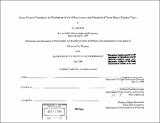From form to function : an evaluation of the effectiveness and potential of form-based zoning codes
Author(s)
Kohr, R. Todd (Robert Todd), 1976-
DownloadFull printable version (18.92Mb)
Other Contributors
Massachusetts Institute of Technology. Dept. of Urban Studies and Planning.
Advisor
Eran Ben-Joseph.
Terms of use
Metadata
Show full item recordAbstract
This thesis analyzes the effectiveness and potential of form-based zoning codes, focusing on three research questions: (1) Are form-based codes a fundamentally-different alternative to Euclidean zoning, or are they simply a re-packaged version of design guidelines? (2) Do form-based codes spur better development (defined in New Urbanist terms) than traditional zoning ordinances? (3) Are form-based codes appropriate for use across the entire range of development environments (i.e., urban, suburban, and rural areas)? The thesis answers these questions through an evaluation of case studies of two notable municipal form-based codes: the Columbia Pike Special Revitalization District Form Based Code in Arlington County, Virginia, and the Form Districts incorporated within the new Land Development Code for Jefferson County, Kentucky. For each case study, the thesis analyzes the political and regulatory frameworks, socio-economic makeup, and existing development patterns of the surrounding community. It then examines and evaluates the recently-implemented form-based code, considering the ordinance's intent, composition, and development consequences. After considering both case studies, the thesis formulates conclusions and broader implications regarding the current effectiveness and future potential of form-based zoning codes. The author's research yields certain generalizable conclusions. While form-based codes are not a new idea, they are fundamentally distinct from either traditional Euclidean zoning or most urban design guidelines or standards, shifting the role of zoning from proscriptive to prescriptive and placing form rather than use at the center of the regulatory paradigm. Based on early indications, this change in emphasis appears to yield more consistent, more democratic, more contextual, and more pedestrian- and community-friendly development than that generated by typical zoning codes. And finally, the success of form-based coding seems to be tied less to the scale of development within which it is applied than to the levels of political and economic support that accompany it. It is important to recognize that form-based codes are still a relatively new innovation, and that only time will demonstrate whether they are in the long run successful in stimulating more and better development than more traditional zoning mechanisms. However, initial findings suggest that they hold the potential to yield impressive results.
Description
Thesis (M.C.P.)--Massachusetts Institute of Technology, Dept. of Urban Studies and Planning, 2004. Includes bibliographical references (p. 145-149).
Date issued
2004Department
Massachusetts Institute of Technology. Department of Urban Studies and PlanningPublisher
Massachusetts Institute of Technology
Keywords
Urban Studies and Planning.